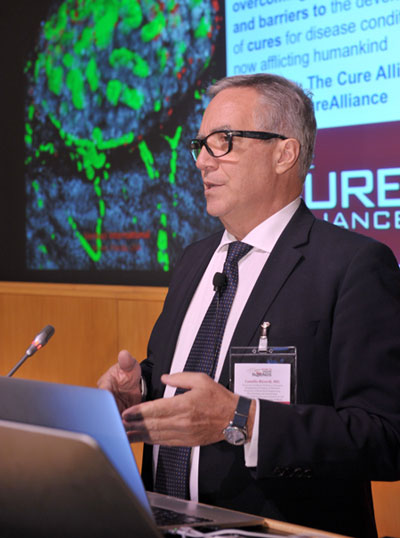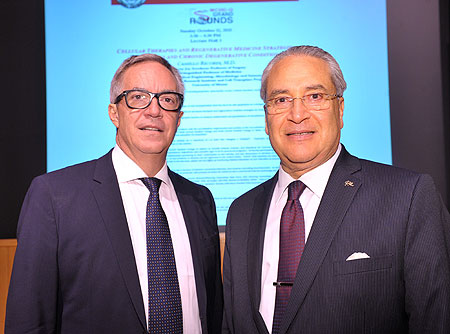World-leading diabetes researcher speaks at Grand Rounds
November, 2015

Leading diabetes researcher Dr. Camillo Ricordi
explains the latest developments in treatment
of the disease.
One of the world’s most pioneering diabetes researchers discussed the latest developments in treatments for the disease at the most recent installment of Weill Cornell Medicine – Qatar’s (WCM-Q) Grand Rounds.
Dr. Camillo Ricordi, director of the Diabetes Research Institute and Cell Transplant Program at the University of Miami, visited WCM-Q to explain how patients with type-1 diabetes had been able to stop taking insulin following ‘islet cells’ transplantation surgery.
Islet cells are found in the pancreas and are responsible for releasing insulin to control blood sugar levels. People with type-1 diabetes are unable to produce insulin because their immune system has malfunctioned and destroyed their islet cells.
The Grand Rounds, developed by WCM-Q’s Division of Continuing Professional Development, provides a platform for expert speakers to engage with healthcare professionals in the community to disseminate knowledge of the latest developments in medical technology, research and best practice. The activity is accredited through the joint providership of Weill Cornell Medicine and Weill Cornell Medicine - Qatar.
Speaking at WCM-Q to an audience of physicians, researchers, students and healthcare professionals, Dr. Ricordi said: "The successful transplantation of islet cells has been encouraging but had limitations including the site of transplantation. In fact, islet are generally transplanted in the liver, enabling them to produce insulin and freeing the patient from the need to constantly administer insulin. However, the liver has several disadvantages as a transplant site and many of the transplanted cells do not survive after intra-hepatic infusion."
For the first time, Dr. Ricordi reported successful islet transplantation using a bioengineered mini-endocrine pancreas transplanted in the abdominal cavity, which represents a much more physiologic technique as it more closely mimics normal human physiology. Dr. Ricordi added: "This represents a great success, but there are still difficulties to be overcome because patients must be treated with immunosuppressant drugs after the procedure to prevent rejection of the transplanted cells, and this carries a risk of undesirable side-effects."
To try to eliminate this problem, Dr. Ricordi and others are working on a series of different technologies that are at the very forefront of scientific discovery. One method utilizes nanotechnology and conformal coating technology to create incredibly small ‘shells’ that protect each transplanted islet from being destroyed by the immune system, while still allowing them to release insulin. Another research strand is investigating the possibility of converting a patient’s own precursor cells found in several tissues, including the pancreas, into insulin-producing cells, removing the need for immunosuppressant drugs.

Dr. Camillo Ricordi of the University of Miami, left, with Dr. Bakr Nour,
senior adviser to the dean and professor of surgery at
Weill Cornell Medicine – Qatar.
Dr. Ricordi is hopeful that these research efforts might one day lead to a cure for type-1 diabetes and that this might also be applied to type-2 diabetes, which is the more common form of the disease. While type-1 diabetes is caused by an autoimmune disorder, type-2 diabetes is often associated with obesity and unhealthy eating habits.
Dr. Ricordi said: "The common perception is that diabetes cannot be cured and must only be managed. We reject this idea because we believe a cure can be found and our research has shown us promising avenues for doing so. Of course, we must not raise hopes that a cure is inevitable or that it will be available immediately, but we are determined to keep trying to find one."
Dr. Ricordi is renowned in the medical world for developing the process that made it possible to isolate islet cells from the human pancreas in very large quantities. Dr. Ricordi also holds the titles of Stacy Joy Goodman professor of surgery, distinguished professor of medicine, and professor of biomedical engineering, microbiology and immunology at the University of Miami.
Dr. Bakr Nour, professor of surgery and senior advisor to the dean at WCM-Q, said: "We are extremely privileged to welcome a scientist of Dr. Ricordi’s caliber to Grand Rounds at Weill Cornell Medicine – Qatar to present his research to the healthcare community here in Doha. Dr. Ricordi’s fascinating insights into diabetes research and transplant technology are not only extremely enlightening and interesting but are also a great source of inspiration for everyone who hopes to see the development of a cure for this debilitating disease."

